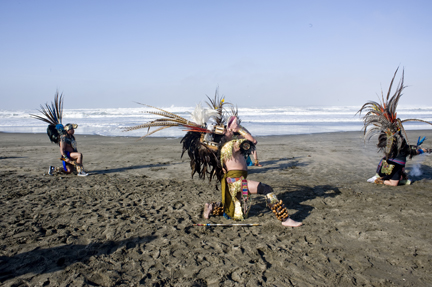American Indians gather to preserve culture
AIM West celebrates Liberation Day instead of President’s Day
By Greg Zeman
The Guardsman

American Indian Movement West, one of the leading Native American activist organizations in the United States, did not celebrate President’s Day on Feb. 15. Instead, they gathered with members and supporters around a fire at Ocean Beach to celebrate Liberation Day with ceremony and song.
The purpose of the celebration was to “cast aside myths and instead raise historical awareness and provide access to networking and building alliances with and between indigenous communities, supporters and youth: connecting issues with people being directly affected by colonialism, racism and poverty,” according to an AIM West press release.
AIM West members and supporters spoke about issues ranging from environmental justice and indigenous land rights to climate change, the wars in Iraq and Afghanistan and the incarceration of Leonard Peltier.
Mark Anquoe, an AIM West activist of the Kiowa Nation, emphasized what he views as the unified nature of all the struggles being celebrated.
“It’s one struggle. This one universal struggle will effect every single one of us; it already is,” Anquoe said. “Native people here have always said — even before the modern struggles — everything is interconnected and it has never been more apparent than now.”
The master of ceremonies for the event was Arizona AIM West activist and spiritual advisor, Leonard Foster of the Navajo/Dine Nation, a veteran of AIM West’s 1973 standoff with the FBI at Wounded Knee.
“I’m a spiritual leader and advisor for Native prisoners in state prisons and federal penitentiaries. I advocate for freedom of worship for Native Americans who are incarcerated,” Foster said. “I take the pipe and tobacco, sage, cedar and sweet grass into the prison for ceremonies. I conduct weekly sweat lodge ceremonies as a way to rehabilitate our people.”
Foster said that while Native Americans face religious persecution in all aspects of society, those in the prison system face even greater challenges.
“The prison officials are using security as an excuse to deny our people equal access to the sweat lodge, pipe ceremonies and talking circles,” he said. “Just the talking circle we had here with the fire is important. We want to be able to do that in the prison setting, to rehabilitate our own people and I find that spirituality is the key to rehabilitation.”
The event’s emphasis on spiritual awareness and ceremonial tradition was seen in pre-colonial dancing by Teokalli-Aztec. The ceremonies included baskets and shells filled with tobacco, sage and cedar for participants to put in the fire.
“Tobacco takes our prayers to the creator,” Foster said. “Sage and cedar are used for an offering to the fire and that is to seal our prayers, our thoughts and our feelings. When you make that offering, it makes a blessing. It’s an ancient ceremonial practice.”
Eileen Vigil, who identifies herself as “mixed blood from Europe and the south lands” spoke about the ravages of war and unchecked corporate greed from a mother’s perspective.
“We give birth to the fodder of war and it has to stop,” Vigil said. “I really think the mothers need to step up … we have to teach each other as women to respect one another; to stop listening to the garbage that’s out there.”
The event’s close proximity to the ocean inspired some to voice concern about its future.
“The oceans are more acidic now than they have been in 65 million years. As that continues to change, the entire life cycle of the world will change,” Anquoe said. “We can either walk the path of life or the path of death because as we let the corporations become more powerful, as we allow the climates to change, mother earth will liberate herself from us.”
City College student and AIM West activist Jose Cuellar said Liberation Day was about the tradition of struggle.
“Political, social, cultural and personal liberation and self determination are the issues that have guided the movements for liberation in the United States and around the world,” Cuellar said. “It’s about the struggle for human dignity, for justice, for the freedom to pray in one’s own style — in one’s own tradition as one is moved by the spirit.”

Comments are closed.